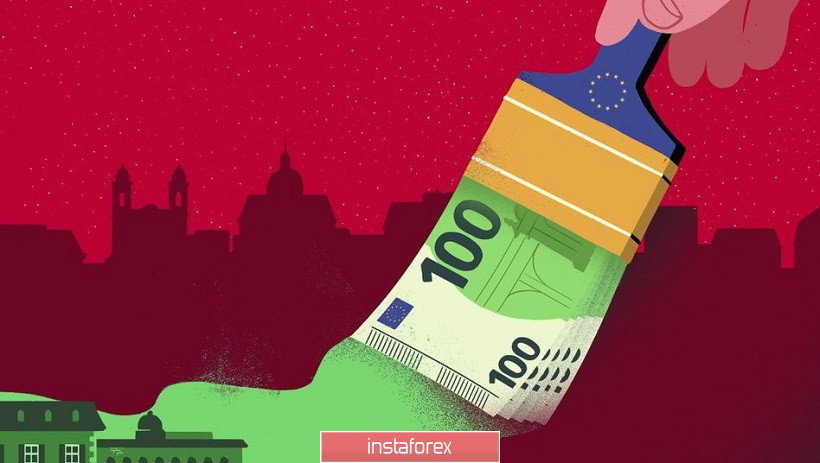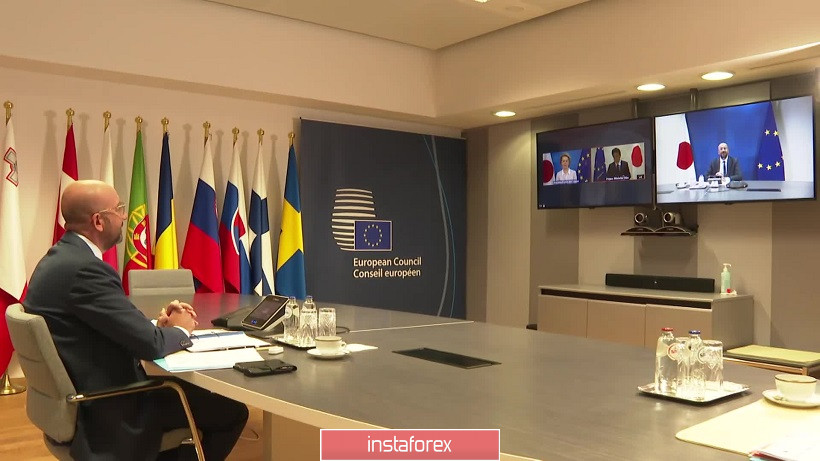The euro/dollar pair was stuck in the middle of the 12th figure. Neither the bears, nor the bulls of the pair are capable of decisive actions now before the summit of the leaders of the EU countries, which will discuss the 750 billion anti-crisis plan of the European Commission. The importance of this event can hardly be overestimated, especially against the background of the ongoing "European confrontation".
Let me remind you that the plan itself was presented at the end of May under the ambitious title "next-generation European Union". At the same time, it became known exactly how Brussels plans to spend the budget. The main part (about 70-80%) of the program will be directed to direct support of the EU countries. At the same time, members of the Alliance will independently prepare scenarios for the recovery of their economy. Brussels, in turn, will consider this scenario and, if approved, allocate a certain amount from the total 750 billion "pot". Priority will be given to the most economically backward EU countries.

The proposed plan provides that 500 billion euros will be provided with grants, and accordingly 250 billion with loans. Money is being offered to be borrowed in the financial markets. Loans will be returned by the countries that took them, but the situation with grants is somewhat different. Naturally, they will also be returned - not individual countries, but the European Union as a whole. To do this, they plan to increase the contributions of the member countries of the Alliance, reduce some costs, use their own resources of the European Union - including through customs duties and VAT. Brussels proposes at first to pay interest on the funds involved - from 2021 to 2027, and then, over the course of 30 years, give back the "body" of loans taken by the European Commission.
Here, it must be emphasized that the anti-crisis plan of the European Commission was supported by Germany, which until then had categorically opposed the "coronabond". But, apparently, there will still be "crown bonds", albeit in a slightly different form than was originally supposed. It is a small matter – it is necessary to convince the "North of Europe", whose representatives can block all initiatives. Let me remind you that the so-called "mean four" - the Netherlands, Austria, Denmark, Sweden, opposed the above scenario. These countries proposed to form a Fund of one-time loans, not gratuitous payments, and for no more than two years with a restriction on the scope of spending.
Actually, tomorrow's summit will revolve around this issue. Its results will make it possible to assess the chances of implementing the anti-crisis plan, which is so important for the eurozone economy. Indeed, even if the program is approved in principle, another procedural step is needed for its implementation: it is necessary to increase the "ceiling" (that is, the upper limit) of the EU's own resources. And for this, ratification of the national legislative bodies of the EU countries is needed. In other words, the proposed program should go through the millstone of the parliaments of all 27 member states of the Alliance. According to some estimates, the full plan of Ursula will start working from the beginning of next year – and this is provided that the above-mentioned "stingy four" do not block it at the approval stage.

In fact, the issue of restoring the Eurozone economy after the coronavirus crisis is at stake at tomorrow's summit. It should be noted that no one expects a full "approval" from the June meeting. On the contrary, almost all experts are confident that supporters and opponents of the anti-crisis plan will only express their positions, while agreements will not be reached until the end of July. This opinion is shared by representatives of the French side. But German Chancellor Angela Merkel at the end of May announced that EU leaders at the June summit would not reach a compromise regarding the next 7-year budget of the bloc and the new fund for economic recovery, but they should agree before the fall.
Thus, the results of the June summit should be viewed through the prism of previous expectations. The fact of the absence of a consolidated position is unlikely to have a strong impact on the euro (although a short-term negative reaction is not excluded). The main attention will be focused on the rhetoric of the EU leadership, leaders of key EU countries and representatives of the countries of the "mean four". If the market sees signs of "negotiability" of the parties, the European currency will rush up, including paired with the dollar (which has recently demonstrated uncertain positions). However, if the parties demonstrate excessive categorization (first of all, it concerns Austria), then the EUR/USD pair will not only return to the 11th figure, but will also reach its foundation (support levels are located at 1.1105 (Kijun-sen line at D1) and at 1.1070 - the upper limit of the Kumo cloud on the same time frame).
In anticipation of such important events, it is extremely risky to make trading decisions. The market may interpret the results of the June summit in its own way, and false price movements are not excluded. Therefore, it is advisable to take a wait-and-see position on the EUR/USD pair to avoid possible losses.





















